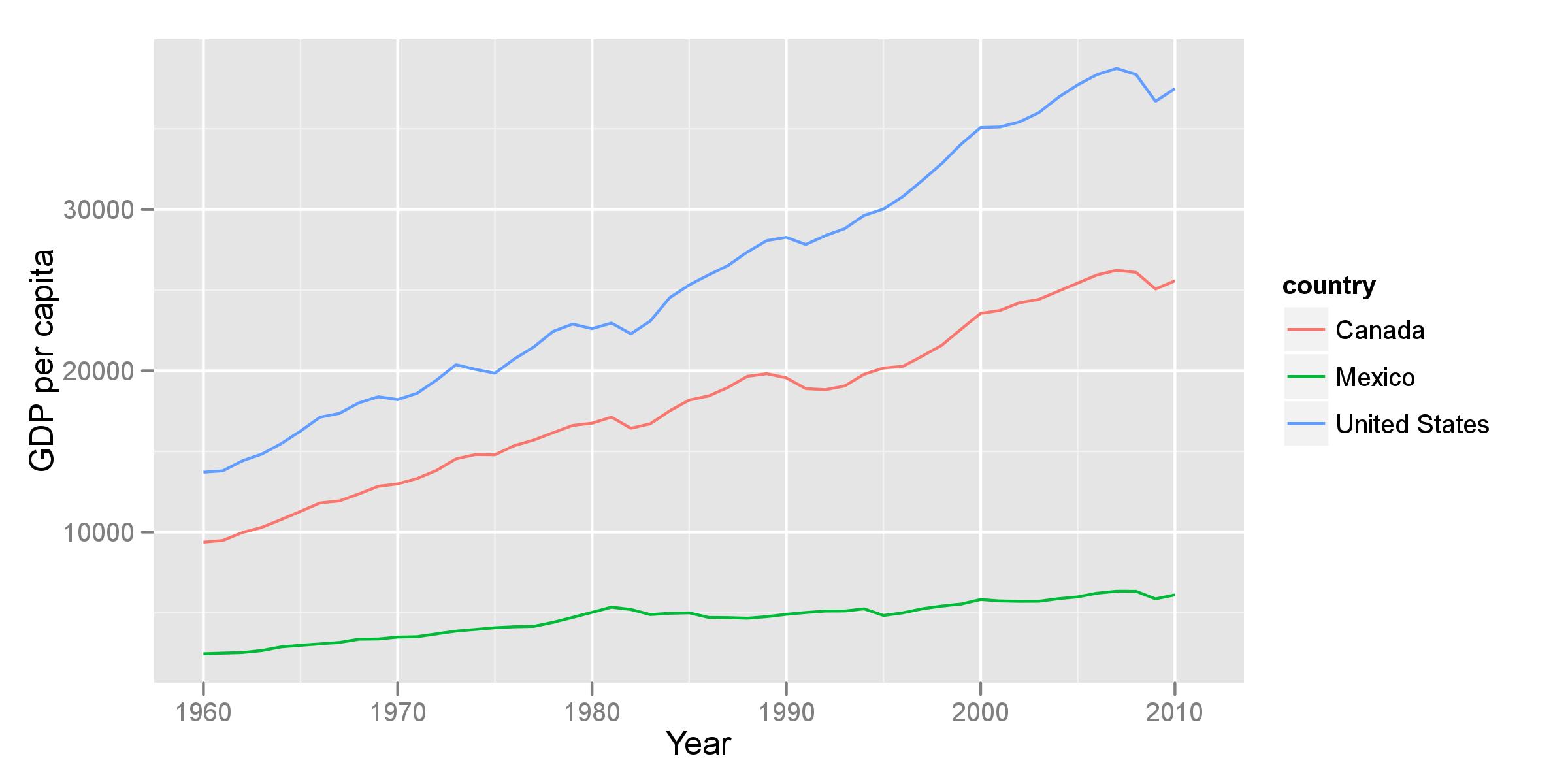The WDI package allows users to search and download data from over 40 datasets hosted by the World Bank, including the World Development Indicators ('WDI'), International Debt Statistics, Doing Business, Human Capital Index, and Sub-national Poverty indicators.
WDI is published on CRAN and so can be installed by simply typing this in the R console:
install.packages('WDI')To install the development version of the package, use remotes:
library(remotes)
install_github('vincentarelbundock/WDI')You can search for data by using keywords in WDIsearch. For instance, if you are looking for data on Gross Domestic Product:
WDIsearch('gdp')Which produces this:
> WDIsearch('gdp')[1:10,]
indicator name
[1,] "BG.GSR.NFSV.GD.ZS" "Trade in services (% of GDP)"
[2,] "BM.KLT.DINV.GD.ZS" "Foreign direct investment, net outflows (% of GDP)"
[3,] "BN.CAB.XOKA.GD.ZS" "Current account balance (% of GDP)"
[4,] "BN.CUR.GDPM.ZS" "Current account balance excluding net official capital grants (% of GDP)"
[5,] "BN.GSR.FCTY.CD.ZS" "Net income (% of GDP)"
[6,] "BN.KLT.DINV.CD.ZS" "Foreign direct investment (% of GDP)"
[7,] "BN.KLT.PRVT.GD.ZS" "Private capital flows, total (% of GDP)"
[8,] "BN.TRF.CURR.CD.ZS" "Net current transfers (% of GDP)"
[9,] "BNCABFUNDCD_" "Current Account Balance, %GDP"
[10,] "BX.KLT.DINV.WD.GD.ZS" "Foreign direct investment, net inflows (% of GDP)" WDIsearch uses grep and ignores cases, so you can also use regular expressions. For instance, if you are looking for GDP per capita in constant dollars:
WDIsearch('gdp.*capita.*constant')
indicator name
[1,] "GDPPCKD" "GDP per Capita, constant US$, millions"
[2,] "NY.GDP.PCAP.KD" "GDP per capita (constant 2000 US$)"
[3,] "NY.GDP.PCAP.KN" "GDP per capita (constant LCU)"
[4,] "NY.GDP.PCAP.PP.KD" "GDP per capita, PPP (constant 2005 international $)"Download a series you like for the countries you like:
dat = WDI(indicator='NY.GDP.PCAP.KD', country=c('MX','CA','US'), start=1960, end=2012)Look at the data:
head(dat)
iso2c country NY.GDP.PCAP.KD year
1 CA Canada 9374.883 1960
2 CA Canada 9479.824 1961
3 CA Canada 9967.366 1962
4 CA Canada 10290.362 1963
5 CA Canada 10774.653 1964
6 CA Canada 11283.606 1965Plot the data:
library(ggplot2)
ggplot(dat, aes(year, NY.GDP.PCAP.KD, color=country)) + geom_line() +
xlab('Year') + ylab('GDP per capita')Note: You can use country='all' to download data for all available countries. You can also feed a vector of indicator strings if you want to download multiple indicators at once.
Some World Bank series are available at the monthly or quarterly frequency. You can download those simply using the start and end arguments:
WDI(indicator = 'DPANUSSPB', country = 'CHN', start = '2012M01', end = '2012M05')
iso2c country DPANUSSPB year
1 CHN China 6.324130 2012M05
2 CHN China 6.303810 2012M04
3 CHN China 6.313545 2012M03
4 CHN China 6.300286 2012M02
5 CHN China 6.313091 2012M01If the vector that you supply to WDI is named, the function will automatically rename columns where possible.
dat <- WDI(indicator = c("gdp_per_capita" = "NY.GDP.PCAP.KD",
"population" = "SP.POP.TOTL"))
head(dat)
iso2c country year gdp_per_capita population
1 1A Arab World 2005 5378.379 316264728
2 1A Arab World 2006 5594.899 323773264
3 1A Arab World 2007 5711.663 331653797
4 1A Arab World 2008 5898.516 339825483
5 1A Arab World 2009 5782.422 348145094
6 1A Arab World 2010 5916.330 356508908To speed up search, WDI ships with a local list of all available WDI series. This list will be updated semi-regularly, but you may still want to update it manually to get access to the very latest data series. To do so, use the cache function:
new_cache = WDIcache()
WDIsearch('gdp', cache=new_cache)Thanks for using WDI! Please send all bug reports and suggestions through the github issue tracker or by email to [email protected]


